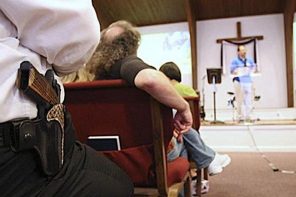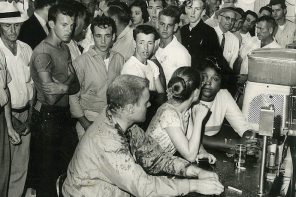I suggested in my last column that some of the hits President Obama has taken recently, especially after his appearance on “The Tonight Show with Jay Leno,” were signs of eight years of pent up electoral rage. I suggested as well that this President, through his very exposure to us—not least the vulnerability that comes with actual care—serves as such a dramatic contrast to the previous president that he is a victim of his own virtue. He has put himself on stage, literally and figuratively, and in so doing he has become the target at which reporters aim their ire, posing irksome questions that simply were not tolerated by the Bush team.
And then it happened. At his press conference last Tuesday, the President got huffy about a question, one asking why he’d been slow to comment on the audacity of the AIG bonuses that dominated the news last week and threatened to drown out the real economic story: the President’s audacious budget, and the flurry of renewed debate and partisan bickering it has generated. It was the President’s body-English as much as anything that suggested he’d had enough; his answer—that he likes to have his facts in order before he responds to something—seemed reasonable enough. Take a look:
So what is going on? And by that I mean what is going on with the viewing public as well as with this President? The frustrating position President Obama now occupies is clear enough. He had no honeymoon at all. He walked into the greatest crisis any president since FDR has inherited, and his problems are exacerbated because the partisanship of this moment is so much deeper and more complex than it was in the crisis years between the two world wars.
This President is a genuine centrist, and thus doomed to alienate the left and the right in equal measure. He is a genuinely bipartisan figure who continues to secure legislation with virtually no support from the Republican party. He is a Washington change-agent who immediately fell into the oldest capitol parlor game: important nominees withdrawn for apparent scandals, real or imagined, all of this distracting from the real and crushing burden of the tasks before him. He has weathered criticism from every quarter, and remains steadfast in his commitment to listen to good ideas wherever they come from. Yet, when he is done listening, he is singular in his determination to pass the plan he has decided is best. Then the shouting begins again.
It’s no wonder he got testy; the wonder is that it took so long.
But there is something new about this presidency, something that sets President Obama apart from the other great communicators of recent memory: Ronald Reagan and Bill Clinton. In short, it is this president’s exposure. This president places himself on stage as no other US president has ever done. And that is why I suggested that insights from the ancient Greek theater might be useful for analyzing some of his recent troubles.
This president has been on “60 Minutes” twice since taking office two months ago. This president is the first sitting president ever to appear on a late night talk show. This president invited ESPN to watch him fill out his NCAA basketball brackets (he picked UNC to go all the way). This president made a studied attempt to recognize reporters, and news outlets, heretofore unrecognized by the White House. And on Thursday morning, this president held a first-ever electronic town hall meeting, streamed online in real time, thereby announcing a whole new era of presidential exposure and openness. In short, this president has taken center stage.
There are very real dangers to this kind of theatrical overexposure. Even FDR, whose situation is perhaps most comparable to this president’s first hundred days, only broadcast thirty “fireside chats” in twelve years. He was painfully aware of the dangers of media exposure. This is a cautionary tale for any president in the era of the postmodern media.
This is the warning that Greek drama provides. It is a warning that gains salience once we understand the essential link between tragedy and comedy that the Greeks perceived in their theaters. Both tragedy and comedy are consumed with vulnerability and changes of fortune. The great leader will be brought low. One must go down in order to be raised up. These upward and downward arcs can be funny, and they can be terrifying, and they are always awesome. There is something magnetic about the theater; the Athenians also felt that there was something essentially democratic about tragedy and comedy.
We like to see our political leadership slip on a banana peel. That is the democratic work of comedy. We are horrified to see our political leadership slip at all, especially in time of war. That is the democratic work of tragedy.
According to the story the Athenians told themselves about the invention of their theater, a mythical man named Thespis was responsible for the singularly religious innovation that made tragedy and comedy possible. There had long been choreographed choruses of thirty or more costumed men who performed what were essentially choral odes in honor of the god, Dionysus. One of the central myths they recalled was the terrifying ripping of that god to shreds, and the reassembly of his corpse by the other Olympians.
Dionysus was the dying-and-rising god. And drama was the place where his reversals of fortune were enacted.
Then Thespis had an idea. What would happen if he separated one of the chorus members from the chorus? In short, individuality was born. An individual emerged from the chorus and a new theatrical possibility emerged: dialogue, the very heartbeat of a democracy. That individual could engage in a dialogue with the chorus after it had finished its collective song-and-dance. So the Greeks pulled a second character from the chorus. Then a third. And now the full dramatic possibilities of triangulation were visible. On the ancient Greek stage, there were never more than three speaking characters on stage at any one time.
In tragedy, which predated Greek comedy by more than a generation, that individual was placed at great risk. He was exposed. And in many cases, the masked individual on the Greek tragic stage was understood to be yet another form of Dionysus, participating in his own tragic reversals of shredding, reassembling and returning to the collective from which he emerged. The democratic individual emerges only to be reabsorbed into the chorus at the end.
Before he or she was reabsorbed, that individual became the focal point of the tragedy. The individual’s very exposure made him or her suffer for the chorus, which stood by as witness and sympathetic bystander. But there is nothing the chorus can do. The individual is out there, alone, exposed. The vengeance of the god is certain.
And then comes comedy, and the vengeance of the jealous democratic mob becomes certain as well. Pretty soon, we find ourselves laughing at the very exposure of the individual that had so terrified us before.
All of these dramatic moves we have seen, in scarcely two months. So long as this president is so exposed, we will see more of them. If we wish this president to remain so exposed, and there is every suggestion that the vast majority of the electorate does, then we should be a bit more understanding when he becomes frustrated by the role we are asking him to play.



